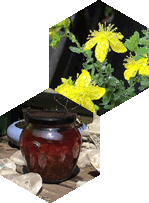Vibrational essences (often called flower essences or flower remedies) preserve the vital life force of a substance for use in healing. An ancient form of healthcare, essences are used to prompt greater levels of health and well-being in the user. Though essences made from flowers are the best-known type, we like to call them "vibrational essences" because they can be made from many other energies besides those of flowers. This includes other parts of plants besides flowers (stems, leaves, roots, buds, the whole plant), minerals/gems, animals, energy of a place (called "environmental" essences), light (star, moon, colored), healing energies (like Reiki). Essences are usually in a liquid medium, generally water with a preservative like alcohol added. You may also find them in an oil base, or an ointment or cream, though this is more unusual. Vibrational essences are a part of ancient wisdom, and have been found in aboriginal cultures throughout the world.
The 16th century master physician and herbalist Paracelsus also used essences. The best-known essence maker of the modern world is the English physician Dr. Edward Bach. He re-invented essences in the 1930's, creating the popular Bach Flower Remedies. They are used widely throughout the world. In the past 15 years or so, many new essences companies were founded all over the world. They offer a wide range of essences made in new and creative ways. These newer essences advance Dr. Bach's original work by meeting the needs of this specific time in wonderful, new ways, using more up-to-date energies.
Flower Essences
http://www.fesflowers.com
http://www.bachflower.com/
http://pegasusproducts.com/
http://www.starfloweressences.com/
http://www.rainbowcrystal.com/bach/bach.html
http://www.flowersociety.org/
http://www.alaskanessences.com/
http://www.floweressenceproducers.org/
http://www.treefrogfarm.com/
Herbal Medicine, sometimes referred to as Herbalism or Botanical Medicine, is the use of herbs for their therapeutic or medicinal value. An herb is a plant or plant part valued for its medicinal, aromatic or savory qualities. Herb plants produce and contain a variety of chemical substances that act upon the body.
Herbal medicine is the oldest form of healthcare known to mankind. Herbs had been used by all cultures throughout history. It was an integral part of the development of modern civilization. Primitive man observed and appreciated the great diversity of plants available to him. The plants provided food, clothing, shelter, and medicine. Much of the medicinal use of plants seems to have been developed through observations of wild animals, and by trial and error. As time went on, each tribe added the medicinal power of herbs in their area to its knowledgebase. They methodically collected information on herbs and developed well-defined herbal pharmacopoeias. Indeed, well into the 20th century much of the pharmacopoeia of scientific medicine was derived from the herbal lore of native peoples. Many drugs commonly used today are of herbal origin. Indeed, about 25 percent of the prescription drugs dispensed in the United States contain at least one active ingredient derived from plant material. Some are made from plant extracts; others are synthesized to mimic a natural plant compound. The World Health Organization (WHO) estimates that 4 billion people, 80 percent of the world population, presently use herbal medicine for some aspect of primary health care. Herbal medicine is a major component in all indigenous peoples’ traditional medicine and a common element in Ayurvedic, homeopathic, naturopathic, traditional oriental, and Native American Indian medicine. WHO notes that of 119 plant-derived pharmaceutical medicines, about 74 percent are used in modern medicine in ways that correlated directly with their traditional uses as plant medicines by native cultures. Major pharmaceutical companies are currently conducting extensive research on plant materials gathered from the rain forests and other places for their potential medicinal value. Substances derived from the plants remain the basis for a large proportion of the commercial medications used today for the treatment of heart disease, high blood pressure, pain, asthma, and other problems. For example, ephedra is a herb used in Traditional Chinese Medicine for more than two thousand years to treat asthma and other respiratory problems. Ephedrine, the active ingredient in ephedra, is used in the commercial pharmaceutical preparations for the relief of asthma symptoms and other respiratory problems. It helps the patient to breathe more easily. Another example of the use of a herbal preparation in modern medicine is the foxglove plant. This herb had been in use since 1775. At present, the powdered leaf of this plant is known as the cardiac stimulant digitalis to the millions of heart patients it keeps alive worldwide. Herbal Medicine can be broadly classified into various basic systems: Traditional Chinese Herbalism, Ayurvedic Herbalism, and Western Herbalism, which originally came from Greece and Rome to Europe and then spread to North and South America. Chinese and Ayurvedic Herbalism have developed into highly sophisticated systems of diagnosis and treatment over the centuries. Western Herbalism is today primarily a system of folk medicine. Interest in the United States had been growing in the recent years from the reported success stories from the use of herbs. For example, St. John's Wort is widely used in the treatment of mild depression without the need for Prozac. St. John's Wort does not have the side effects such as that of Prozac. There are some Ayurvedic herbs that are very useful for reducing cholesterol, diabetes etc. Similarly the popularity of Ginseng and Ginkgo biloba (ginkgo) is rising due to its beneficial effect.
BiodynamicsSpiritual Science about Plant World
Herbal HealingCancer Salves Herbal Cancer Treatments
Sage Mountain Herbal Retreat Center & Botanical Sanctuary
Susun Weed herbal medicine healing
Frontier natural product coop
Mountain Rose Herbs










